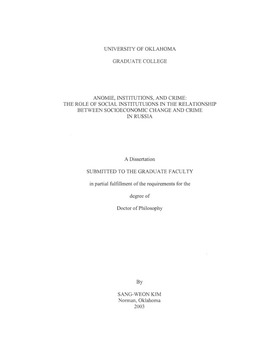| dc.contributor.advisor | Pridemore, William Alex, | en_US |
| dc.contributor.author | Kim, Sang-weon. | en_US |
| dc.date.accessioned | 2013-08-16T12:19:08Z | |
| dc.date.available | 2013-08-16T12:19:08Z | |
| dc.date.issued | 2003 | en_US |
| dc.identifier.uri | https://hdl.handle.net/11244/657 | |
| dc.description.abstract | This dissertation examines social change, social institutions, and crime in Post-Soviet Russia. Russia has experienced rapid social and economic change following the collapse of the Soviet Union, creating anomic conditions and social disorganization. Further, as the country moves toward capitalism, it is likely that Russians are beginning to adopt a capitalist ideology and an emphasis on individual economic success that may go unchecked in the accompanying anomic environment. However, while anomie and the ineffective social control may increase crime rates, the strength of non-economic social institutions such as family, education, and polity may condition the impact of social change on crime and violence. In order to test these hypotheses generated by Durkheim and by Messner and Rosenfeld's institutional anomie theory, I employ cross-sectional data from Russia's 89 regions in 2000 and OLS regression techniques to examine (1) how the varying pace of negative social change in the country has influenced crime and violence, (2) if social institutions influence the cross-sectional variation of crime rates in Russia, and (3) the conditioning role in this relationship played by the strength of social institutions. The findings show that socioeconomic change is consistently positively and significantly related to the variation of regional homicide rates, but not robbery and burglary rates, in Russia. Social institutions play a mixed role in homicide and property crime rates in Russia. The strength of polity is negatively and significantly related to both homicide and property crime rates, while education is negatively related to homicide and has no association with property crime. Finally, of the three institutional measures, only education appears to condition the effects of socioeconomic change 14 on homicide, while none of the non-economic institutions appear to condition the effects of socioeconomic change on property crime. In sum, the findings suggest that negative socioeconomic change in transitional Russia is important in explaining the variation of violence in Russia and that social institutions do not appear to condition the effects of negative socioeconomic change on crime and violence in the country. | en_US |
| dc.format.extent | xii, 157 leaves : | en_US |
| dc.subject | Social institutions Russia (Federation) | en_US |
| dc.subject | Anomy. | en_US |
| dc.subject | Sociology, Criminology and Penology. | en_US |
| dc.subject | Sociology, Social Structure and Development. | en_US |
| dc.subject | Social change Russia (Federation) | en_US |
| dc.subject | Crime Sociological aspects Russia (Federation) | en_US |
| dc.subject | Crime Russia (Federation) | en_US |
| dc.title | Anomie, institutions, and crime: The role of social institutions in the relationship between socioeconomic change and crime in Russia. | en_US |
| dc.type | Thesis | en_US |
| dc.thesis.degree | Ph.D. | en_US |
| dc.thesis.degreeDiscipline | Department of Sociology | en_US |
| dc.note | Source: Dissertation Abstracts International, Volume: 64-09, Section: A, page: 3490. | en_US |
| dc.note | Adviser: William Alex Pridemore. | en_US |
| ou.identifier | (UMI)AAI3107297 | en_US |
| ou.group | College of Arts and Sciences::Department of Sociology | |
